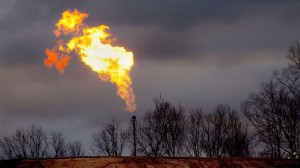From an Article by Ann Gibbons, Science Magazine, December 13, 2017
The extraordinary growth in fracking—the hydraulic fracturing of deeply buried shale rock to extract natural gas—has transformed the United States over the past 15 years, boosting energy stocks, cutting pollution from conventional coal-power plants, and creating new jobs. But this boom may have come at a cost. According to the first large-scale study of babies born before and after natural gas extraction began in Pennsylvania, those living near fracking sites had significantly lower birth weights—and worse health—than other babies.
Concerns about the health effects of fracking aren’t new. Absent solid evidence, some states, including Maryland and New York, have even banned the practice altogether. Now, a growing number of studies suggests that living near oil and gas developments is associated with a wide range of negative outcomes, from higher rates of asthma and migraines to more hospitalizations for cardiovascular disease, neurological disorders, and cancer. Earlier studies have also found associations with low–birth weight babies, but those were plagued by low sample sizes or a failure to show that health effects got worse closer to drilling sites, as expected if fracking were to blame.
Now, health economist Janet Currie at Princeton University and her colleagues have tried to overcome those problems by looking at birth certificates for all 1.1 million infants born in Pennsylvania between 2004 and 2013—a period that spanned the drilling of thousands of fracking wells in the state, which now has more than 10,000 of them. The birth certificates included addresses and vital statistics for each infant, such as birth weights, total months of gestation, birth defects, and other abnormal conditions. The researchers overlaid those data on maps showing when and where wells were drilled in Pennsylvania. They then drew concentric circles around each site: one at 1 kilometer, one at 2 kilometers, and one at 3 kilometers.
They found that infants born within 1 kilometer of a well were 25% more likely to have low birth weights (less than 2500 grams or 5.5 pounds) than infants more than 3 kilometers away, they report today in Science Advances. Babies born in the first circle also showed significantly lower scores on a standard index of infant health. Infants born in the outer circles—between 1 and 3 kilometers away—were smaller and less healthy than those who lived farther away, but they weren’t as badly off as babies born closest to the wells.
To rule out other factors that could lead to poor health outcomes, including race and socioeconomic status, the team removed babies born in urban areas like Pittsburgh and Philadelphia, which have comparatively high rates of lower birth weight babies. They also compared siblings born to the same mothers who lived near fracking sites before and after it started. Although this sample size was small—only 594 infants exposed to fracking had unexposed siblings—it showed that the exposed infants were smaller and less healthy.
The good news is that the effects don’t extend far beyond the fracking sites, Currie says. The study found no decrease in infant weight or health past 3 kilometers. But the team doesn’t know what aspect of fracking caused the low birth weights, which put babies at higher risk for infant mortality, asthma, attention deficit hyperactivity disorder, lower test scores, and lower lifetime earnings. Currie, who studies air pollution and health, says it’s likely air pollution from chemicals or the increased truck traffic and industrialization associated with fracking. Water pollution is an unlikely culprit because many people in the study got their water from municipal sources not close to fracking sites.
But Erica Clayton Wright, spokesperson for the Marcellus Shale Coalition in Pittsburgh, says the study doesn’t go far enough to address “crucial issues linked to low birth weights like smoking as well as alcohol and drug use. … Given these deep methodological flaws, it’s dangerously misleading and inflammatory to suggest that natural gas development has done anything but improve public health.”
Though there is no “smoking gun” that proves how fracking impairs infant health, economist Don Fullerton—who studies how public policies affect the environment at the University of Illinois in Urbana—calls the evidence “convincing” and says it adds to other studies that have also found evidence of preterm births and other negative health effects. That makes it even more important, he says, to regulate what chemicals are used in fracking or how close wells can be to residential areas.
Currie adds that infants, who are essentially the “canaries” near the fracking mines, probably aren’t the only victims. If they are experiencing negative effects, the elderly and other vulnerable people near wells are likely to also be at risk. “We really should move beyond the discussion of whether there is a health effect or not to figuring out how we can help people who live close to fracking.”


{ 1 comment… read it below or add one }
Study shows fracking is harmful to infants
As we all know, pipelines start somewhere, and that somewhere is in the fracking fields. The prestigious Atlantic Monthly magazine is posting an article about a recent massive study that shows lower birth weights and worsened health outcomes for babies born very close to fracking activities.
https://www.theatlantic.com/science/archive/2017/12/data-from-11-million-infants-suggests-fracking-harms-human-health/548315/
–Allen Johnson
Allen Johnson, President
Eight Rivers Council
12664 Frost Road
Dunmore,West Virginia 24934
tel. 304-799-4137
Email allen@eight-rivers.org
http://www.eight-rivers.org